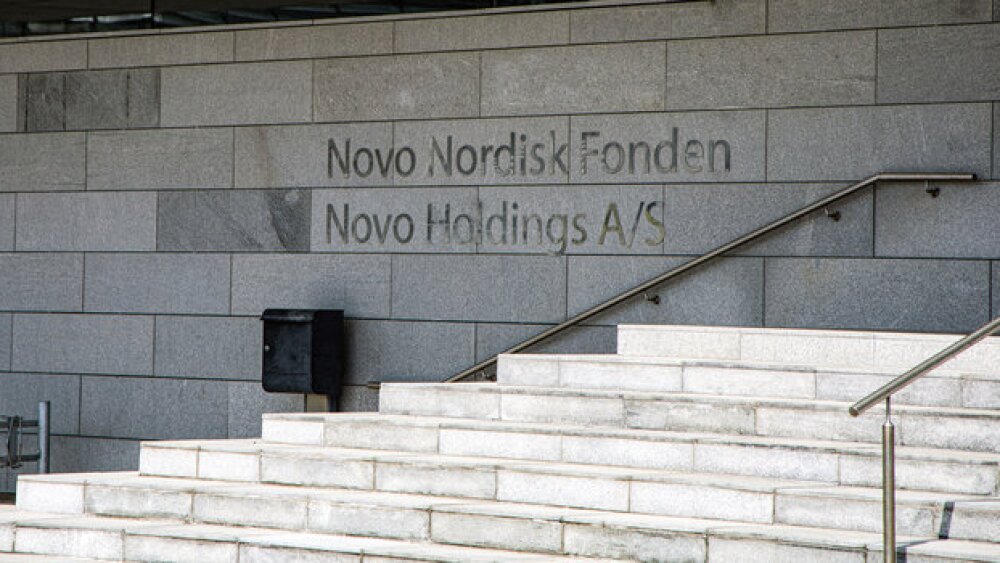Novo Nordisk seems to believe it can do a better job managing troubled Catalent than the contract manufacturer. However, the Danish drugmaker has its work cut out for it.
Pictured: Wall sign of the Novo Nordisk Foundation and Novo Holdings in Denmark/iStock, CR
Last week, the big news was Novo Holdings’ announced $16.5 billion acquisition of contract development and manufacturing organization Catalent. Under the terms of the deal, Novo Nordisk is taking three of Catalent’s manufacturing sites for $11 billion to bolster production of its blockbuster diabetes drug Ozempic and weight-loss medication Wegovy.
Apparently, the Danish drugmaker believes it can do a better job managing troubled Catalent than the CDMO’s executive team. However, Catalent’s revenue losses in 2023 were a staggering $539 million amid declining demand for COVID-19 vaccines and treatments, and with total debt of more than $5 billion as of the end of last year—not to mention its widespread quality control problems—Novo has its work cut out for it.
In 2023, Catalent was plagued by productivity issues and manufacturing challenges at multiple sites, which forced Novo to bring on Thermo Fisher Scientific as a second manufacturer amid soaring demand for Wegovy and Catalent’s production problems at a factory in Brussels, Belgium. The FDA found quality control problems at Catalent’s Bloomington, Indiana, site in November 2023, including the discovery of a “pest” on the manufacturing line, according to an inspection report obtained last week by Reuters through a Freedom of Information Act request.
Last week, Catalent reported that revenues for the second quarter of its 2024 fiscal year were down 11% in constant currency. Nonetheless, CEO Alessandro Maselli in a statement said that thanks to Novo Holdings’ sizable resources, Catalent “will be able to accelerate investment” in its business and “enhance key offerings for current and prospective pharma and biotech customers.” At the same time, given the pending merger with Novo Holdings, the company will no longer provide forward-looking guidance—how convenient!
Despite Catalent’s latest quarterly numbers, analysts told BioSpace that Novo Holdings made the right decision in buying the CDMO to increase manufacturing capacity for its diabetes and weight-loss drugs. Still, much speculation remains on what the Catalent acquisition means for existing customers—such as Novo’s competitor Eli Lilly—and what the consequences might be on the regulatory front in terms of potential antitrust issues as the European Medicines Agency investigates the possible impacts on drug supplies.
With manufacturing issues persisting, last year’s shortages of medicines—including weight-loss drugs—will continue in 2024 despite both Novo and Lilly investing billions of dollars in new production capabilities.
Until the Novo deal closes at the end of 2024, subject to regulatory approvals and other customary conditions, it appears to be business as usual at Catalent. In an SEC filing on Wednesday, Catalent revealed that it laid off about 300 employees in the fourth quarter of 2023 as part of a restructuring the CDMO announced last year that included axing 1,100 jobs and closing its facility in San Francisco.
Separately, another company that appears to be struggling is Biogen. On Tuesday, the large biotech reported fourth-quarter 2023 financial results that underwhelmed Wall Street, with revenue and earnings per share missing analyst expectations due to disappointing performances from Alzheimer’s disease treatment Leqembi and postpartum depression medication Zurzuvae.
In addition, Biogen’s Q4 revenue from multiple sclerosis drugs fell 8% due to generics competition. According to the company’s guidance, revenue is expected to drop by a low- to mid-single-digit percentage this year with core pharmaceutical revenue anticipated “to be relatively flat for 2024 compared to 2023 as further declines in multiple sclerosis product revenue are expected to be offset by increases in revenue from new product launches.”
Just when you thought things couldn’t get worse for Biogen, the company on Wednesday reported that it has been issued subpoenas by the U.S. Department of Justice and the Securities and Exchange Commission. The DOJ is seeking more information regarding Biogen’s overseas operations, while the SEC is looking into the launch of the controversial and now-defunct Alzheimer’s therapy Aduhelm.
Maybe some monster company will buy Biogen and save it from itself—like Novo riding to the rescue of Catalent.
Greg Slabodkin is the News Editor at BioSpace. You can reach him at greg.slabodkin@biospace.com. Follow him on LinkedIn.






